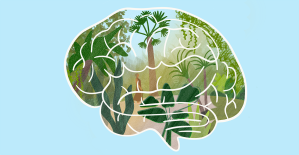Tag: Genetics
-
Health
Research in brief
Major differences in protocols used to determine brain death; Harvard researchers achieve stem cell milestone; Consortium links chromosome abnormality to autism disorders; Blocking HIV infection; Oral osteoporosis meds appear to reduce the risk of jaw degradation; Six new genetic variants linked to heart-disease risk factor; Gene variation may elevate risk of liver tumor in some…
-
Health
‘Where do I come from?’
Harvard graduates often return to the University to let their professors know what they’ve been up to since they finished their degree.
-
Health
Chromosomal abnormality linked to autism disorders
Researchers have fitted another piece into the complex genetic puzzle that is autism, finding DNA deletions and duplications on a specific chromosome that they say explains one to two percent…
-
Health
Gene variation may elevate risk of liver tumor in patients with cirrhosis
A genetic variation appears to significantly increase the risk that individuals with cirrhosis of the liver will develop hepatocellular carcinoma (HCC), a liver tumor that is the third leading cause…
-
Health
Scientists identify gene responsible for statin-induced muscle pain
Statins, the popular class of drugs used to lower cholesterol, are among the most commonly prescribed medications in developed countries. But for some patients, accompanying side effects of muscle weakness and pain become chronic problems and, in rare cases, can escalate to debilitating and even life-threatening damage.
-
Health
Genome study charts genetic landscape of lung cancer
An international team of scientists Sunday (Nov. 4) announced the results of a systematic effort to map the genetic changes underlying lung cancer, the world’s leading cause of cancer deaths.
-
Health
Researchers track down arthritis gene
Researchers at Brigham and Women’s Hospital and the Broad Institute of MIT and Harvard have discovered a gene involved in rheumatoid arthritis, a painful inflammation that affects 2.1 million Americans and which can destroy cartilage and bone within the afflicted joint.
-
Health
Decoding effort reveals fly species’ DNA
An enormous effort to decode the DNA of one of science’s most important laboratory animals — the fruit fly — ended in success this week as a collaboration of researchers from 16 nations announced the sequencing of 10 fly species’ genomes.
-
Health
Researchers track down rheumatoid arthritis gene
Researchers at Brigham and Women’s Hospital (BWH) and the Broad Institute of MIT and Harvard have discovered a gene involved in rheumatoid arthritis, a painful autoimmune disease that affects 2.1…
-
Health
Study paints genetic portrait of lung cancer
An international team of scientists today announced the results of a systematic effort to map the genetic changes underlying lung cancer, the world’s leading cause of cancer deaths. Appearing in…
-
Health
DNA reveals Neanderthal redheads
Ancient DNA retrieved from the bones of two Neanderthals suggests that at least some of them had red hair and pale skin, scientists report this week in the journal Science. The international team says that Neanderthals’ pigmentation may even have been as varied as that of modern humans, and that at least 1 percent of…
-
Health
‘Speed limit’ found on rate of evolution
Harvard University scientists have identified a virtual “speed limit” on the rate of molecular evolution in organisms, and the magic number appears to be six mutations per genome per generation — a rate of change beyond which species run the strong risk of extinction as their genomes lose stability.
-
Health
Scientists synthesize memory in yeast cells
Harvard Medical School (HMS) researchers have successfully synthesized a DNA-based memory loop in yeast cells, an experiment that marks a significant step forward in the emerging field of synthetic biology.
-
Health
First robust genetic link to height in humans identified
Over a century ago, scientists first proposed that height is a complex trait — one influenced by environmental factors and multiple genes. While subsequent studies revealed that most of the…
-
Health
Scientists have something to chew on
In a groundbreaking study, two Harvard scientists have for the first time extracted human DNA from ancient artifacts. The work potentially opens up a new universe of sources for ancient genetic material, which is used to map human migrations in prehistoric times.
-
Health
Brain implants relieve Alzheimer’s damage
Genetically engineered cells implanted in mice have cleared away toxic plaques associated with Alzheimer’s disease.
-
Health
Gene variants significantly increase risk for breast cancer
Newly identified inherited variants of a single gene increase breast cancer risk for women of European ancestry approximately 20 percent if they carry one copy of the gene and by 60 percent if they carry two copies. These variants, in the FGFR2 (Fibroblast Growth Factor Receptor 2) gene, were found in more than half of…
-
Health
Opossum genome shows ‘junk’ DNA source of genetic innovation
A tiny opossum’s genome has shed light on how evolution creates new creatures from old, showing that change primarily comes by finding new ways of turning existing genes on and…
-
Nation & World
Advances in genetics can help kids learn
Education was becoming a no-brainer, some people at Harvard’s Graduate School of Education (HGSE) complained. Kurt Fischer and his colleagues looked at the revolution in brain scanning, genetics, and other biological technologies and decided that most teachers and students weren’t getting much benefit from them.
-
Health
Manipulating genetic switch in mice eases MD symptoms
Scientists at Dana-Farber Cancer Institute have shown in a laboratory study that revving up a crucial set of muscle genes counteracts the damage caused by a form of muscular dystrophy.
-
Health
Genome-wide map will help fight diabetes
The Broad Institute of MIT and Harvard, Lund University, and Novartis have announced the completion of a genome-wide map of genetic differences in humans and their relationship to type 2 diabetes and other metabolic disorders. The announcement was made Monday (Feb. 12). All results of the analysis are being made accessible, free of charge, on…
-
Health
Viruses get the silent treatment, any disease is a target
What do you do if you’re sure you’ve found a way to knock out the AIDS virus but you can’t get the medicine into infected cells? That was the problem faced by Judy Lieberman, a professor of pediatrics at Harvard Medical School.
-
Health
Mystery muscles make mightier mice
Scientists have muscled in on a genetic switch that allows mice to run longer and faster. Humans possess the same switch, so the discovery might open new paths to treating muscle-wasting diseases and building better bodies.
-
Health
World’s largest flower evolved from family of much tinier blooms
The plant with the world’s largest flower – typically a full meter across, with a bud the size of a basketball – evolved from a family of plants whose blossoms are nearly all tiny, botanists write this week in the journal Science. Their genetic analysis of rafflesia reveals that it is closely related to a…
-
Campus & Community
HSPH, Broad map malaria genetic diversity
Researchers have created the first map of genetic diversity of the malaria parasite, providing new insights in the fight against a public health scourge that kills one person every 30 seconds.
-
Campus & Community
Research finds mutation that causes Noonan syndrome
Scientists have discovered that mutations in a gene known as SOS1 account for many cases of Noonan syndrome (NS), a common childhood genetic disorder that occurs in one in 1,000…
-
Campus & Community
Fruit fly bouts show gender-specific styles
Fighting like a girl or fighting like a boy is hardwired into fruit fly neurons, according to a study in the Nov. 19 Nature Neuroscience advance online publication by a…
-
Health
Harvard researchers map new form of genetic diversity
A new map of human genetic diversity provides a powerful tool for understanding how each person is unique. Created by researchers at Harvard Medical School, Brigham and Women’s Hospital, and…
-
Campus & Community
Sensitivity to pain explained
Stabbing back pain or the aches of arthritis send some people to bed in misery while the same distress seems easily tolerated by others.


